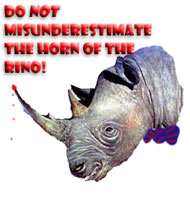March 19, 2005
Anyone Want To Hunt A Rhino?
So, a couple of months ago, the Cake Eater husband---a former frequent flier---recieved an ultimatum from United Airlines: use your miles to buy magazine subscriptions or suffer the indiginity of having spent mucho dinero on airline tickets without receiving anything in return. Since there weren't enough miles in the account to actually, you know, go anywhere, we opted for the subscriptions. The list was decent, but paltry. He opted for Cigar Aficianado and I opted for Vogue (I know. Even I'll admit that choice doesn't sound anything like me. What can I say? Some people love pr0n. I love ads.) and Conde Nast Traveler, which, I have to say, is quite fun, providing you read it with the proper attitude.
In each issue there is a feature titled "Stop Press," which covers some of the more political aspects of traveling. Some of these are actually useful, like the article they produced on the state of the airline industry, but some are examples of the worst of moonbat tendencies, like April's feature (not online yet), "Back in the Crosshairs." The introduction reads:
"Hunting safaris are booming, and after decades of protection, the nearly extinct Black Rhino is once again fair game. Debra A. Klein reports from southern Africa, where hunters and even many conservationists believe that the best way to save endangered wildlife is to kill it."
Yep. You know it's gonna be good, right? Shivers of delight and anticipation run up and down your spine.
To sum up the struggle:
a. the population of certain large game animals has increased since people are no longer allowed to hunt them.
b. some countries in Africa actually make more money from hunting safaris than they do from the photo variety---or any other industry for that matter. Four times as much money, in fact. And certain populations are completely dependent upon these safaris for their livelihood.
c. it's good to thin the herd every now and again, and these quotas that are being established within Namibia and South Africa for the Black Rhino are of a most benign nature, i.e. only males past reproducing age, no females or babies, etc.
d. such an action could keep poaching to a minimum.
e. Some conservationists like this idea, particularly ones located in the countries affected, because it's not only good for the landscape, but it's also good for the people---because, you know, they will be able to eat. Conservationists and wildlife protection groups, located in London and D.C., of course, have gone into alarmist mode, and say it will lead back to the days when the Rhino was hunted solely for its horn (which, according to the article is in high demand as a medicine in China) and nothing else. Of course, according to these conservationists, the African landscape will turn into a benighted place as a result, littered with dead rhinos, the flies swarming over their carcasses.
Overall, it was good bathtime reading last night. But the part that made me laugh loudly enough to make the husband shout from the other room, "What's so funny?" (Surprisingly, our itty-bitty bathroom has quite the echo.) What made me laugh was the author's attempt to make all of this this relevant for their American readership, and I quote:
{...}For many Americans, it is difficult, if not impossible, to imagine any benefits from killing wildlife, and images on safari company websites of hunters smiling proudly over slain lions, elephants and cheetahs can seem shocking and cruel. But in Africa, the view is very different: big game can threaten lives and livelihoods, especially when their numbers reach beyond what the environment can accomodate. Large cats such as leopards can decimate a farmer's livestock; an elephant can upend simple homes and trample planted fields.{...}
{Insert much snickering here}
Forgive the language, but no shit, Sherlock. Thanks for the reminder that the steak on your plate in the chi-chi Manhattan restaurant actually has to be raised.
What's really funny, though, is that the author actually seems to forget about human beings actually being at risk from large game, even though she later cites the fact that in Kenya, where there is a complete ban on hunting, fifteen human beings die each year as the result of being trampled by a rogue elephant. The risk to humans from large game is an after-the-fact sort of thing, and is treated as such throughout the article, as are the proposed benefits of hunting. It's all about the animals!
The way Klein treats the subject matter and her audience, well, gosh, it makes one wonder, doesn't it, if, in fact, human beings are actually---gasp--- foie gras to some species? What does one do in such a circumstance? Would a four-inch stilletto work as an adequate defense against a charging rhino? Would that get it to stop?
Posted by Kathy at March 19, 2005 11:40 AMOh thats sure to upset the animal rights freaks they think the rhinos are disapearing maybe the rhinos are just hiding from the eco-freaks
Posted by: mad heron at March 21, 2005 10:51 PM



